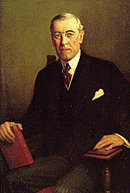43g. Woodrow Wilson's New Freedom

President Wilson
Progressives did not come only in the Republican flavor. Thomas Woodrow Wilson also saw the need for change.
Born in Staunton, Virginia, Wilson served as president of Princeton University and governor of New Jersey. He combined a southern background with northern sensibilities.
Attacking the Triple Wall of Privilege
His 1912 platform for change was called the New Freedom. Wilson was an admirer of Thomas Jefferson. The agrarian utopia of small, educated farmers envisioned by Jefferson struck a chord with Wilson. Of course, the advent of industry could not be denied, but a nation of small farmers and small businesspeople seemed totally possible. The New Freedom sought to achieve this vision by attacking what Wilson called the Triple Wall of Privilege — the tariff, the banks, and the trusts.
Tariffs protected the large industrialists at the expense of small farmers. Wilson signed the Underwood-Simmons Act into law in 1913, which reduced tariff rates. The banking system also pinched small farmers and entrepreneurs. The gold standard still made currency too tight, and loans were too expensive for the average American. Wilson signed the Federal Reserve Act, which made the nation's currency more flexible.
Unlike Roosevelt, Wilson did not distinguish between "good" trusts and "bad" trusts. Any trust by virtue of its large size was bad in Wilson's eyes. The Clayton Antitrust Act of 1914 clarified the Sherman Act by specifically naming certain business tactics illegal. This same act also exempted labor unions from antitrust suits, and declared strikes, boycotts, and peaceful picketing perfectly legal.
In two years, he successfully attacked each "wall of privilege." Now his eyes turned to greater concerns, particularly the outbreak of the First World War in Europe.
Appeasing the Bull Moose
When Wilson's first term expired, he felt he had to do more. The nation was on the brink of entering the bloodiest conflict in human history, and Wilson had definite ideas about how the postwar peace should look. But he would have to survive reelection first.
As an appeal to the Roosevelt progressives, he began to sign many legislative measures suggested by the Bull Moose Campaign. He approved of the creation of a federal trade commission to act as a watchdog over business. A child labor bill and a workers' compensation act became law. Wilson agreed to limit the workday of interstate railroad workers to 8 hours. He signed a federal farm loan act to ease the pains of life on the farm.
Progressive Republicans in the Congress were pleased by Wilson's conversion to their brand of progressivism, and the American people showed their approval by electing him to a second term.






